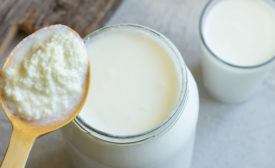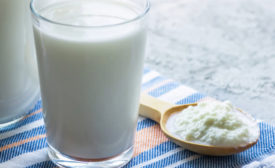Home » digestive health
Articles Tagged with ''digestive health''
Ingredient Showcase
Ingredient suppliers highlight the latest innovations for pre-, post- and probiotics
January 8, 2025
Yogurt provides big benefits
Examining the nutritional properties of fermented dairy products.
December 13, 2024
Fermented dairy foods work their magic on digestive health
It’s important to strike a balance between “good” and ”bad” bacteria in the gut.
March 20, 2024
World Digestive Health Day highlights changing GI needs
With so many consumers now looking to address their digestive and immune health, it is important to realize that supporting a person’s inner defense begins in the womb.
May 29, 2023
Dairy, digestion and fermented foods
While fermented foods and probiotics are trending, these nutrients have been essential in diets for 10,000 years.
September 6, 2022
Probiotics, prebiotics are natural partners for dairy
These ingredients can attract today’s health-concerned shoppers.
December 6, 2021
Making probiotic claims can be tricky
Probiotics have multiple health benefits, but navigating the narrow line between dietary supplement and drug claims can be challenging.
August 6, 2018
Dairy processors, consider the probiotic strain
Not all probiotics are created equal; dairy processors must understand the ‘nuanced but important differences’ among strains
June 7, 2018
Stay ahead of the curve. Unlock a dose of cutting-edge insights.
Receive our premium content directly to your inbox.
SIGN-UP TODAYCopyright ©2025. All Rights Reserved BNP Media.
Design, CMS, Hosting & Web Development :: ePublishing








.jpg?height=168&t=1685047376&width=275)


.jpg?height=168&t=1639062115&width=275)



